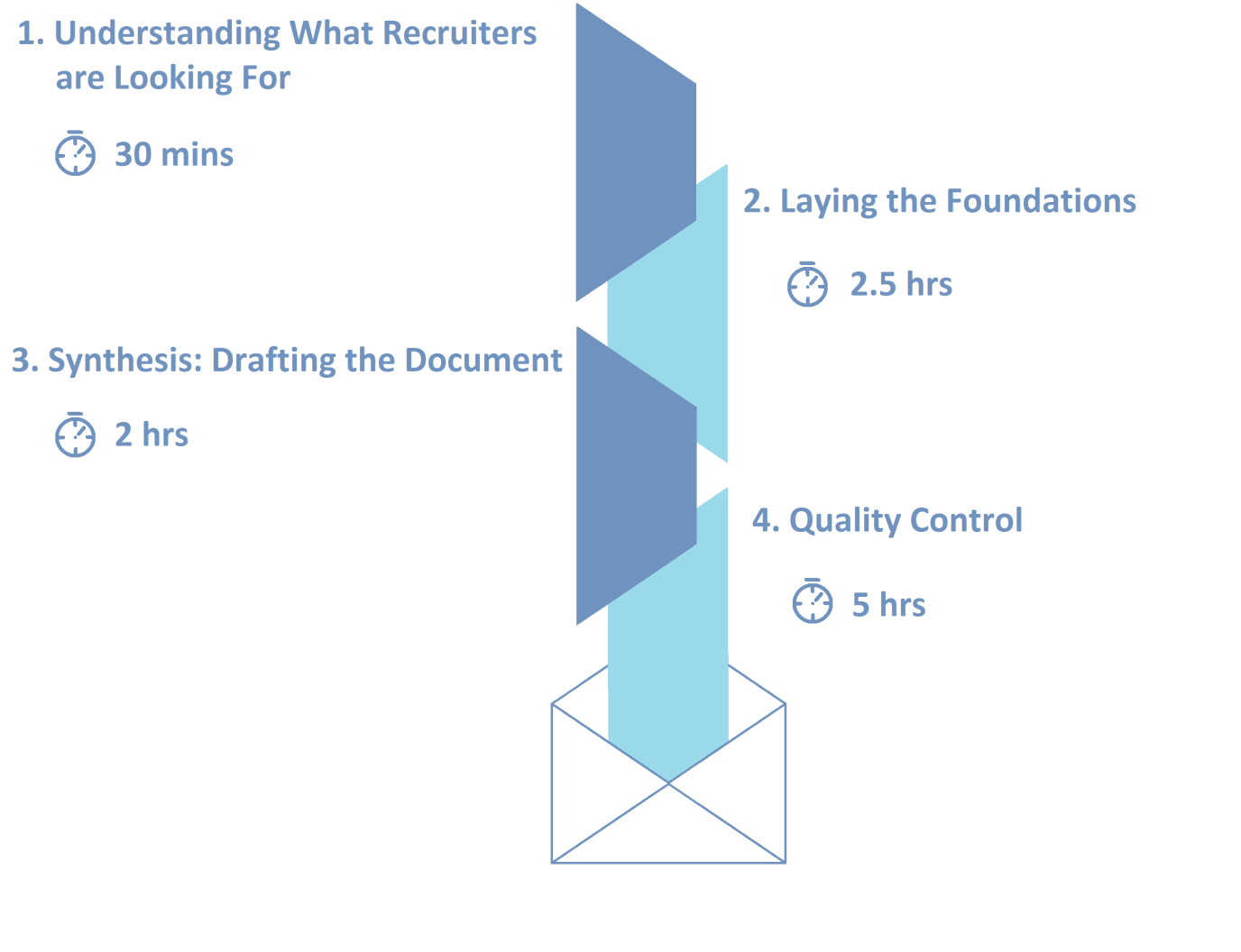Introducing Our New AI-Powered Chatbot Mentor!
Get personalized support from our new chatbot, trained on MCC extensive consulting material, expert insights, and previous reviews from our coaches. This AI-powered mentor can guide you through drafting an effective resume and even review it, ensuring it meets the standards top consulting firms expect.
Free Resume Review
If you want to break into management consulting, your resume, together with networking , is going to be crucial.
This might seem obvious, but many consulting applicants hugely overlook the importance of writing a good resume. The numbers speak for themselves, though. Typically, 60%+ of candidates will be cut right off the bat based on their resumes. By the numbers, this then makes the resume the single biggest difference-maker in the whole selection process.
Even somewhere like McKinsey, where most applicants are asked to sit the Solve assessment before any substantial cut is made, resumes still remain a huge part in deciding who is then actually invited to interview.
Of course, you might well already have an up-to-date general resume sitting there in a folder on your laptop. The temptation would be to just write some cover letters and fire off your applications with your generic resume attached. However, this would be a big mistake, as the demands on a consulting resume are not only stricter but simply different to resumes for other industries.
To hammer home the point, surveying consultants in Summer 2024, MCC was told that the quality of how well the average resume is written has gone up significantly in recent years (we think largely due to a proliferation of great guides like this one). Where a big chunk of resumes are coming in close to perfect in terms of format and style, you absolutely need to make sure your own is just as polished, so it doesn’t end up looking sloppy by comparison.
So, what do you have to do with your resume to have a shot of getting through to the next round of selection and eventually landing an interview?
In this article, we’ll take you through our four step method to put together your best possible management consulting resume. With about ten hours work from start to finish, our approach should set you up with a resume that will genuinely impress your recruiters.
If all this seems like a lot of effort for just one resume, you might first want to weigh those hours against the salaries up for grabs at top management consultancies. In that context, you should also recall that rising bar in terms of the quality of the average resume coming from your competitors.
As a bonus, though, you will be able to re-use your resume in the future within consulting. The approach we teach here is very much the industry standard for high-end consulting firms. This means that you will get to use the same resume pretty much unaltered for all your applications. And, once you’ve made it in and are moving through your consulting career, you can simply modify this original document as you go.
Note that this highly recyclable nature of consulting resumes is completely different from consulting cover letters. Whilst consulting resumes always function simply to convey the same overarching consulting skillset, their companion cover letters will need to be as specific as possible, not just to firms, but to individual offices.
Thus, whilst you might use the same resume across applications to McKinsey, Bain, BCG, Kearney and Deloitte, a cover letter for a role at McKinsey New Jersey will have to be significantly different to one for McKinsey New York.
An important point that came up in the same survey of consultants was that, as resumes get better and better, firms are looking harder at cover letters as a way to differentiate candidates. As such, once you optimise your resume, our cover letter guide should your next port of call to round out a viable application.
First things fist, though - let’s dive into perfecting your resume!
Professional Help
Before we go further, if this already seems like a lot, you might want to skip straight to our professional application editing service here:
PROFESSIONAL CONSULTING RESUME REVIEW
This takes away the stress about getting things right by getting help directly from a 5+ year experienced MBB management consultant. Before doing so, make sure you make the most of our AI Resume Reviewer.
Or, if you would just like an experienced consultant helping you right though the whole selection process, from networking and applications to case cracking and fit interviews, you can check out comprehensive mentoring options here:
Otherwise, let’s get on with it…
Four Steps to Success
In summary, our four-step method for generating management consulting resumes is as follows:
1. Understanding What Recruiters are Looking For - 30mins
You might be tempted to skip past this step, as you probably have a vague idea as to the kinds of skills that might be relevant to management consulting. However, fuzzy ideas from browsing consulting content on Reddit are no substitute for a rigorous understanding of what is required of you.
We will see that you need to be as specific as you can. Thus, it pays to have firm grasp of the precise skills and qualities recruiters are after so that your resume addresses all these traits as clearly as possible.
2. Laying the Foundations - 2.5 hours
Rather than jump straight into writing the resume itself, you should first collect and elaborate all the data you are going to draw upon. This gives you a pool of points that you can draw upon to build the final document itself. This also makes it easier to iterate and improve your consulting resume later.
3. Synthesis: Drafting the Document - 2 hours
This is the most straightforward step of the four. You already have all the necessary points from Step Two, so all you have to do is follow the standard guidelines set out here and/or download our free consulting resume template (available in Word, PowerPoint, and LaTeX at the bottom of this article) to put everything together.
4. Quality Control - 5 hours
Effective editing is key! Again, it is tempting to skimp on this step, but it is the most important of the four. You need to make sure that what you have written is actually recruiter-ready and is the best that it can be.
Our detailed checklist is the best way to make initial revisions. However, getting decent feedback is crucial but might not be straightforward, so can introduce some variation in the time required for this step.
You should iterate the editing process of feedback and modification until the resume is ready to submit.
With our help, then, you'll hopefully soon have secured an invitation to online cases, aptitude tests and/or interview and generally be ready to turn your attention to the next steps of learning how to crack case studies and answer fit questions.
To get you to that point, let's go through this four-step method in greater detail. Oh, and if you prefer the video version - have a look below!
Step One - Understanding What Recruiters are Looking For

Fundamentally, the perfect management consulting resume is whatever the recruiter wants to see.
Most consulting firms list similar sets of key qualities they want to see from candidates. Generally, something like the following set of skills will be required in a consulting resmume:
- Analytical - have high cognitive capacity and an analytic mindset
- Problem solving - able to apply your intellect to generate effective solutions to complex problems
- Delivery of results - be able to put your ideas into action to generate positive outcomes
- Leadership - have the ability to take the lead on projects
- Entrepreneurial spirit - have a strong personal drive and be prepared to take individual initiative
- Functional expertise - be familiar with the business world and understand how it works at a practical level
- Teamwork - be able to manage relationships and work productively with others
You can find information about what McKinsey, Bain and BCG are looking for on those firms' own websites. Bain has also made the following video about the skills required for consulting, reiterating our points here:
Getting Noticed - Signals

The skills above are indeed what recruiters are looking for. However, your consulting resume might be a record of success bursting with these skills, but still fail to get you an interview.
How could this be?
The simple reason is that, beyond any automated initial filter by AI tools, management consulting resumes are only scanned and not read. McKinsey, for instance, gets 200,000+ applications per year. Even the most diligent recruiters only have so much time, and so most McKinsey resumes are reviewed and rejected within 30 seconds.
To avoid your resume joining the others in the wastepaper basket, you need to help the reader out and signal your skills as clearly as possible. All other considerations are secondary, as if your skills are not immediately obvious from a quick glance down your resume, you will simply not be progressed.
So, how do you get noticed?
We will spend the rest of this article breaking down the nuts and bolts of how to write a management consulting resume that properly signals your skills. However, at higher-level, to be noticed and taken seriously, a good consulting resume must do all of the following:
1. Comply with Industry Standards
A "normal" resume for another industry is usually a fairly simple chronological record of your past roles and experiences. However, more is required of a management consulting resume.
Before we even consider how the content of a consulting resume needs to differ from that of a more traditional resume for another industry, we must understand the particular form a consulting resume is expected to take.
At the most basic level, you need to stick very precisely to the standard, industry guidelines for writing a management consulting resume. For instance, you should keep to one page, use a standard typeface, have four to five sections, and omit any photographs. Consulting resumes that stray from the accepted formula will be discarded as soon as they are glanced at - simple as!
We do give some tips on formatting later in this article. However, rather than exhaustively go through the minutiae, we find it easier to simply provide you with a set of free management consulting resume templates at the end of this article so that you can forget about formatting and focus on great content! These are provided in Word, PowerPoint, and LaTeX formats.
2. Skill-Oriented
Of course, a management consulting resume isn't just defined simply by some basic matters of formatting. Crucially, a consulting resume must demonstrate the skillset outlined above. This is your primary concern, as recruiters won't bring you to interview unless your resume has already made it clear that you have the capacities and qualities they are looking for.
3. Achievement-Focussed
How you go about demonstrating your skillset is crucial. Consulting firms are not particularly interested in specific previous roles that you might have held . Unless you were an astronaut or a secret agent, a job title alone isn't going to impress anyone (and even if you were a secret agent, you couldn't put it on your resume anyway...).
The point is that having had a job doesn't necessarily mean you actually have any particular skills. Just holding a certain role doesn't mean that you were good at it or that you got anything done - it's not hard to find ineffectual employees in any industry, after all.
As such, consulting firms are more interested in the achievements you made in a particular job. What you need to show is that you made a difference in whatever you did. These achievements should act as proof that you have one or more of the key consulting skills above.
4. Appropriate Language
No, we don't mean to avoid swearing! (Though you should definitely avoid swearing...) Many candidates lose recruiters' attention by stuffing their resume with technical jargon from whichever industry or academic field they are coming to consulting from. However, these candidates forget that their recruiter is unlikely to be from the same specific background and will simply not know - or care - what they are talking about.
Instead, your language should always be accessible to a generally educated layperson. For example, let's say you were describing an engineering project - you might write:
"Used unsteady Reynolds-Averaged Navier Stokes computational fluid dynamics to investigate the vortical fluid structures that cause spike-type compressor stall in the high pressure axial compressors of industrial gas turbines."
Instead, it would be better to say something like:
"Used state-of-the-art computer simulations to investigate stall in gas turbines."
When you find yourself simplifying some technical point or other detail, you should also always ask yourself whether the information needs to be included at all. Remember that specific details are only important insofar as they help signal relevant skills your recruiter is seeking out. If some detail isn't relevant to the management consulting skillset, leave it out to make room for something else that is.
Beyond weeding out impenetrable jargon, you should also make sure that you write in as plain and "clean" a manner as possible. Some of this work will inevitably be done during the "quality control" stage, as you tidy up what you have written. However, you should always be thinking about how best to express what you are trying to convey. Keep sentences short and to the point and avoid complex or archaic sentence structures. Don't use ten words where four will do and generally avoid writing such that someone has to double-take to understand what you mean.
For many readers, this will seem like common sense. However, we find that some candidates, from quantitative backgrounds in particular, can be a little rusty when it comes to writing in the very precise manner a management consulting resume requires.
Step Two - Laying the Foundations
Enough reading! Let's get down to business and get some writing done!
The crucial thing to realise here, though, is that jumping straight into writing the final document itself won't yield great results. Instead, you first need to spend some time setting out all the relevant facts about yourself. These facts can then be mapped onto the skills you need to demonstrate. Only after this work is done can you expect to produce the very best version of your resume.
Is your resume perfect?
Find outOur method starts by gathering relevant information, matching this to skills, and demonstrating those skills via specific achievements. Your resume is then produced as a synthesis of the most salient of these pieces of information.
1. Collecting Your Data
You might imagine that writing a management consulting resume is a "positive" business of "building up" the document itself. However, it is better thought of as a subtractive process of "carving away" or winnowing down a pool of items that might be included, so as to select only the most useful elements.
First, then, we have to generate our pool of relevant information. This is the block of marble from which we will carve our masterpiece. To start, you should set out a document listing all the raw facts about yourself. This should include everything, from the most basic items, such as your name and contact details, to your academic qualifications and past employment history. Remember to also list other relevant items, such as language and IT skills and your personal interests and activities outside work.
A note...
Make sure that you have the details correct here. You wouldn't believe how often we see candidates misspell their own email addresses! Imagine getting an interview offer for your dream management consulting job, but never receiving the email as it was sent to the wrong inbox! You don't want to miss out on a whole career due to a typo - check and double check!
2. Skills
Now that we have built our foundation of facts and experiences, it's time to match those to the skills recruiters are looking for. Note that overlap is possible (and indeed likely) in that the same items from your list of facts might be relevant to more than one skill.
Drawing up a table like the example below will help with this process:
| Skill | Example of supporting evidence |
|---|---|
| Analytical |
|
| Problem solving |
|
| Leadership |
|
| Teamwork |
|
| Ability to deliver results |
|
| Functional expertise |
|
| Entrepreneurial spirit |
|
Try to be balanced in your approach here. Each candidate will have their own strengths - however, you need to make sure you have points relevant to all of the relevant skills. What is more, you should give equal weight to each skill. Thus, when you eventually write up your resume, you should be able to have an approximately equal number of points demonstrating each different skill.
3. Achievements

Skills are useless if they aren't used. Achievements show how you managed to leverage your skills to achieve impact - which is precisely what consulting is about.
As we mentioned above, consulting recruiters are not impressed by job titles. Just because you held one job or another does not tell them very much about your abilities - what matters is what you actually got done. Achievements act as proof that you do indeed have the skills needed to thrive as a management consultant.
With five steps, we can move from your relevant experiences to generate eye-catching achievements that will impress your interviewer:
3.1. What Did You Do?
You should have already listed all of the roles you have held across both your academic and professional careers, as well as voluntary or other roles. For each of these, then, you should now list your key responsibilities in each role.
For example:
- Summer Intern: Schedule meetings with investors
- Business Analyst: Created Excel model forecasting demand
- Communication Intern: Helped directors in preparing presentations
- Customer Service Assistant: Responded to customer calls
- Treasurer Of University Society: Managed funds and introduced new sponsors
3.2. What Did You Really Do?
Now we need to dive a little deeper into what you did in these previous roles.
We do this by enriching the description of responsibilities we have just given, adding specific details of the actions you took. In particular, you should provide quantifications wherever possible - numbers are more precise and tend to stick in the reader's memory. The goal here is not to overwhelm or confuse the reader with a lot of unnecessary detail, but rather to demonstrate as precisely as possible what you actually did in each role.
Let's take some examples:
- Scheduled and coordinated monthly meetings with three major investors
- Created analytical model forecasting demand with a 90% accuracy rate
- Helped two directors with market analysis for preparing client proposals
- Responded to 50+ customer complaint calls per day
- Managed £5k funds and introduced two new sponsors
3.3. So What?
The next layer of detail we need to add is some information on the results of each of these actions. Reflect on the implications of what you did, always focusing on the difference you made versus the previous status quo. After all, the whole job of a management consultant is to make a positive difference to the companies they work with - so you can see why this information is interesting to a consulting recruiter!
Specifically, you should consider the impact you made in the following key areas:
- Revenue - Did you increase the company’s revenues by contributing to the acquisition of new clients or by boosting revenues from existing ones? By how much?
- Costs - Did you reduce costs? By how much?
- Processes - Did you increase productivity or reduce downtime? By how much? How did the savings affect the bottom line?
- Customers - Did you improve interactions with customers? In what capacity? What were the main results?
- Client Meetings - Did you participate in client meetings? What contributions did you make to the team? What results did you bring?
- Reports and Presentations - Did you create any important reports or presentations? Who was the intended audience? What results did they bring?
- Recognition - Did you receive any awards, bonuses, or promotions?
Let's take a look at some examples of how we apply this to our descriptions:
- Forged a stronger relationship with three major investor funds
- Achieved a 30% reduction in working capital thanks to better accuracy in demand prediction, currently implemented
- Sold three new projects worth £2m
- Over 85% of customer concerns solved within three hours
- Increased sponsor funding by 30% by introducing two new sponsorship contracts
3.4. Signal Skills through Achievements
Now you have a list of achievements, you are ready to map these onto the skills a consulting resume needs to demonstrate.
Up until this point, the process could almost be applied to any job. However, the careful matching of achievements with the key consulting skillset is what tailors your resume to the job you're after.
The table above, where we matched up skills to previous activities, is your starting point here. For instance, you have already identified that data modelling is relevant to analytic skills. As such, you can demonstrate your analytic skills through an achievement you made in data modelling. Similarly, you might demonstrate your leadership skills by having organized a successful event for a university society.
3.5. Synthesising Your Achievements
There is an art to describing your achievements in a way that clearly links them to the relevant skills and finding the right words is essential. To help you out, we include a comprehensive set of tables of relevant consulting resume keywords or buzzwords in the following section.
Make sure that you don't exceed two to three lines for any single achievement and only include the best three to five achievements for each role you cover. Remember that the goal isn't to exhaustively describe each role, but rather to use it to show why you would make a good consultant.
The following examples show how to both draft your achievements and explain how they signal different skills:
Strengthened relationships with three major investment funds by organisng and coordinating monthly analyst meetings.
Developed analytical model forecasting demand with a 90% accuracy rate, leading to a 30% reduction in working capital. Pitched ideas to top management and launched a multi-phase implementation plan.
Supported two directors with market analysis to prepare persuasive client proposals, leading to the acquisition of three new projects worth £2m
Enhanced customer satisfaction by solving over 90% of 50 daily customer complaints within 3 hours and interacting with over 12 departments in the organization.
Increased society’s budget by 30% (from £3.5k to £4.6k) by negotiating and signing two new sponsorship agreements.
3.6. Buzzwords

Whilst you have probably been taught to avoid using buzzwords in your writing, the opposite is true in resume writing, where the correct keywords or buzzwords help you get your points across to the reader efficiently.
Let's take a look at groups of consulting resume keywords or buzzwords roughly mapping onto the different consulting skill areas noted above. Whilst this might seem like a lot of material, simply browsing these keyword tables whilst you write will make for a much more effective resume - both grabbing a recruiter's attention as they skim your resume and then sounding more professional as they then stop to read more closely.
We have also included an example of one of the buzzwords being used in a resume bullet point for each group of buzzwords.
Communication Skills
In context: Presented to the CFO on a weekly basis concerning the implementation of newly introduced budgeting policies
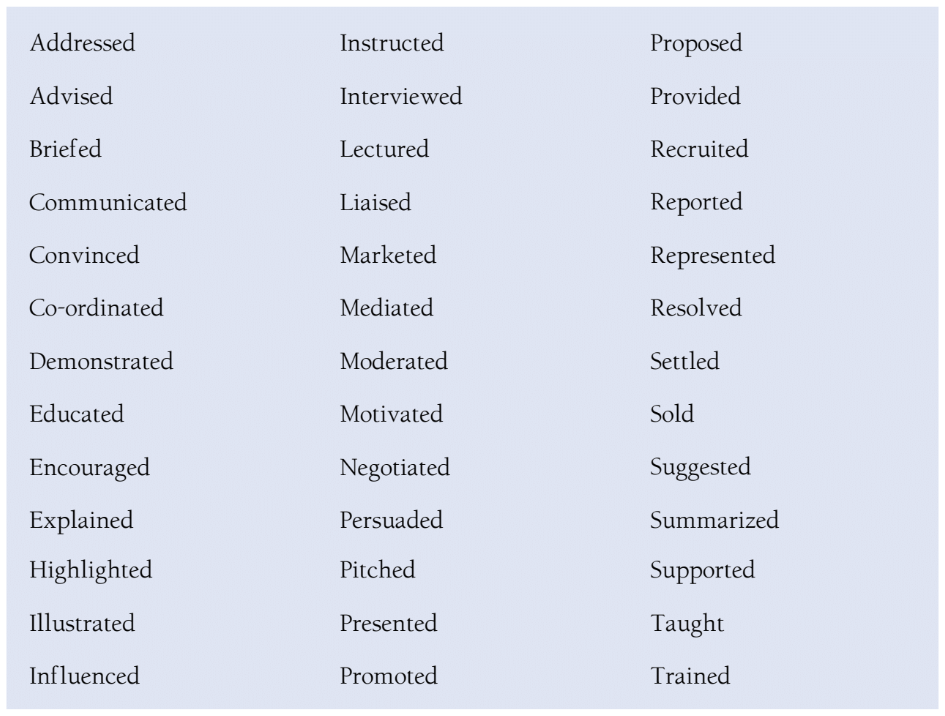
Leadership Skills
In context: Led a team of 20 in the roll out of a new IT system over a 3-year period
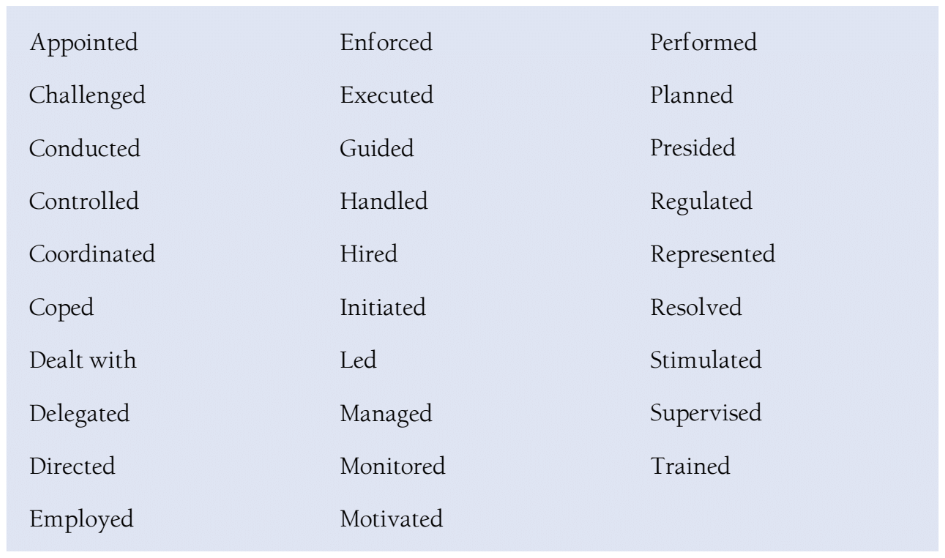
Analytical Skills
In context: Built analytical model forecasting inventory needs with 80% accuracy
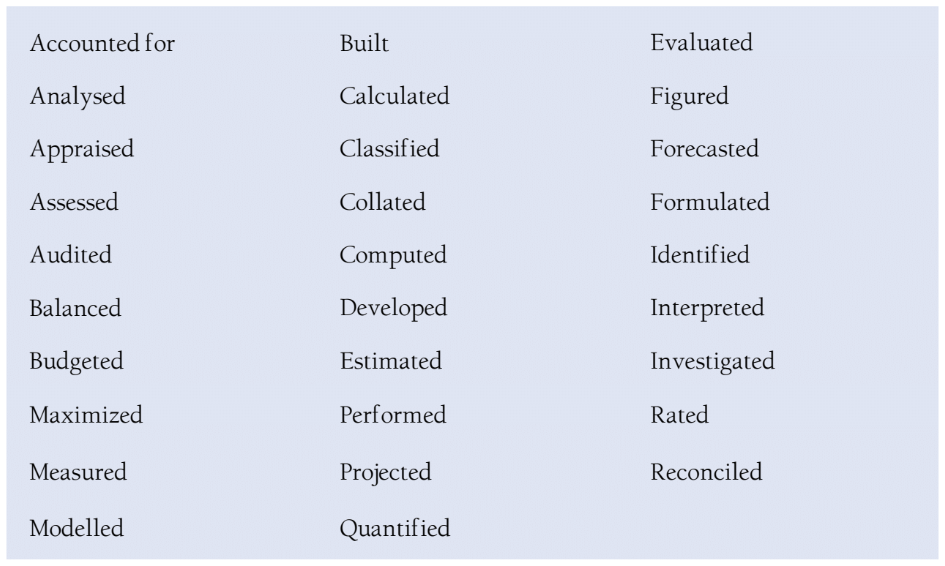
Problem Solving
In context: Devised a new procurement strategy, leading to a 10% saving on commodities purchased
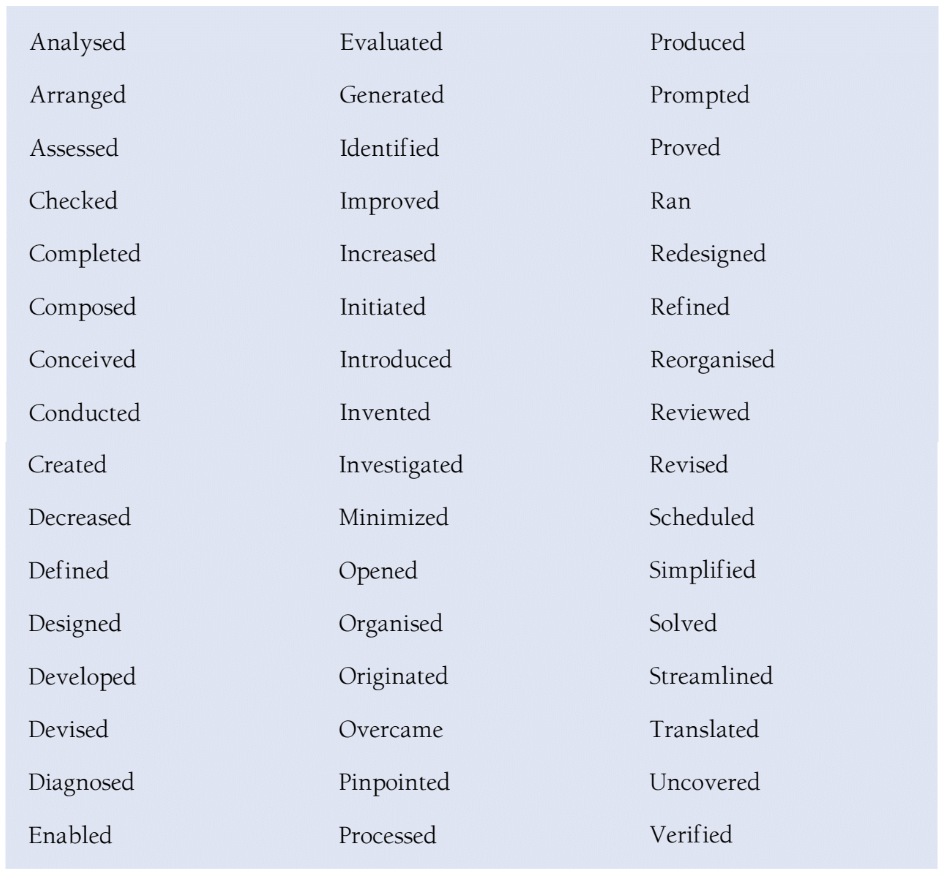
Delivery of Results
In context: Co-founded student support groups with 200 volunteers to provide help during a flood
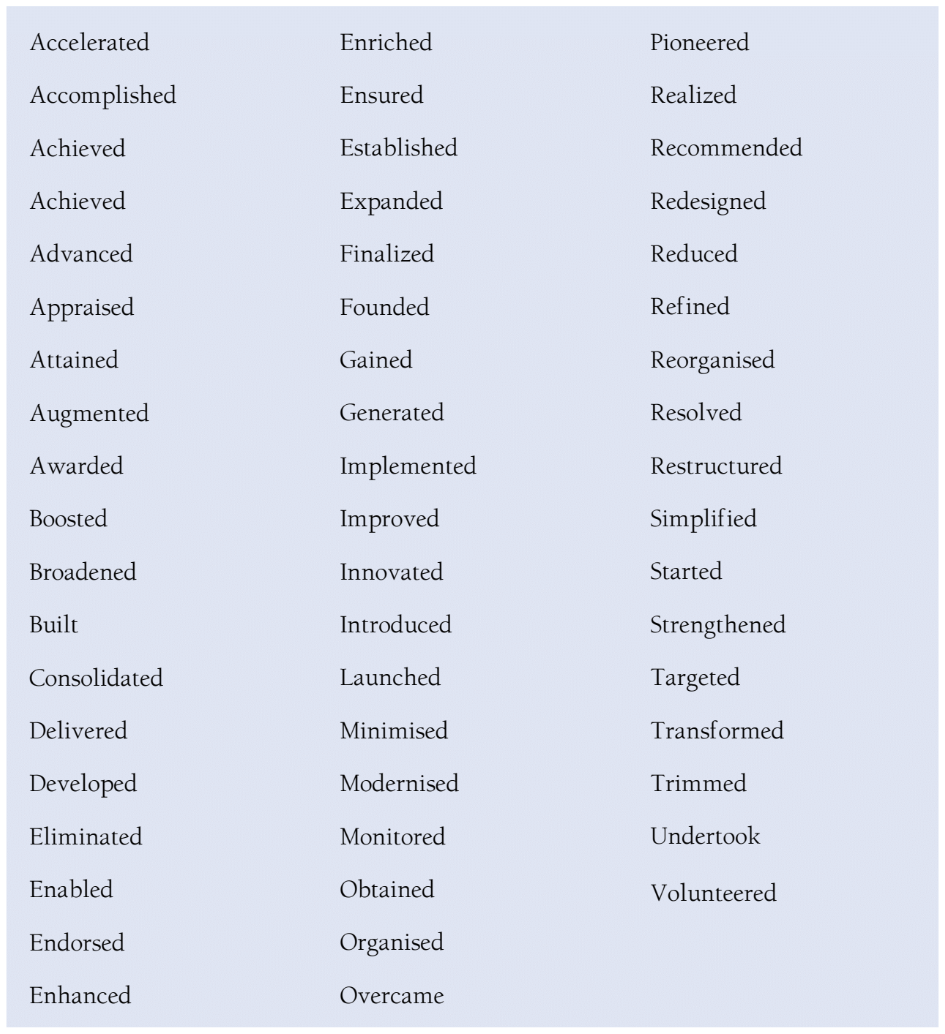
Teamwork
In context: Teamed up with 10 fellow students to raise funds for war widows
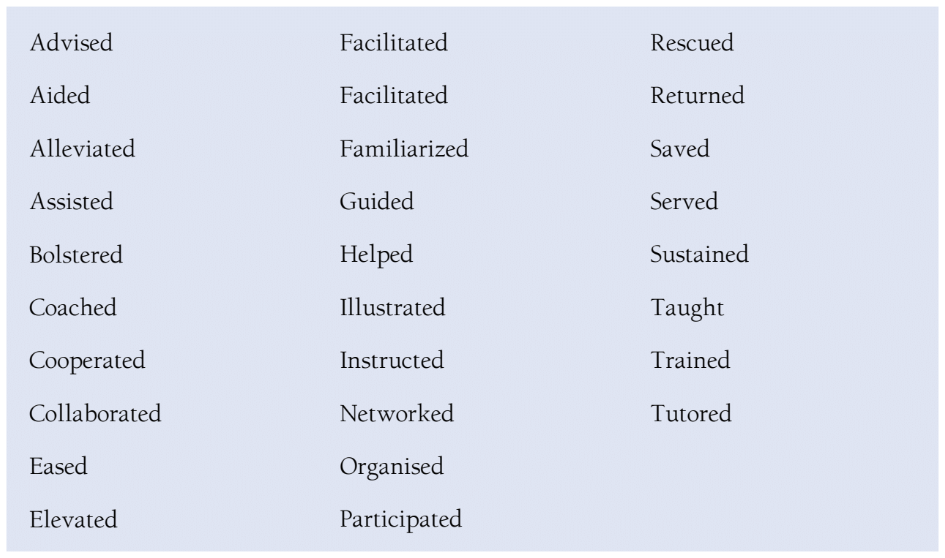
Functional Expertise and Research
In context: Investigated correlation between foreign investment and level of corruption
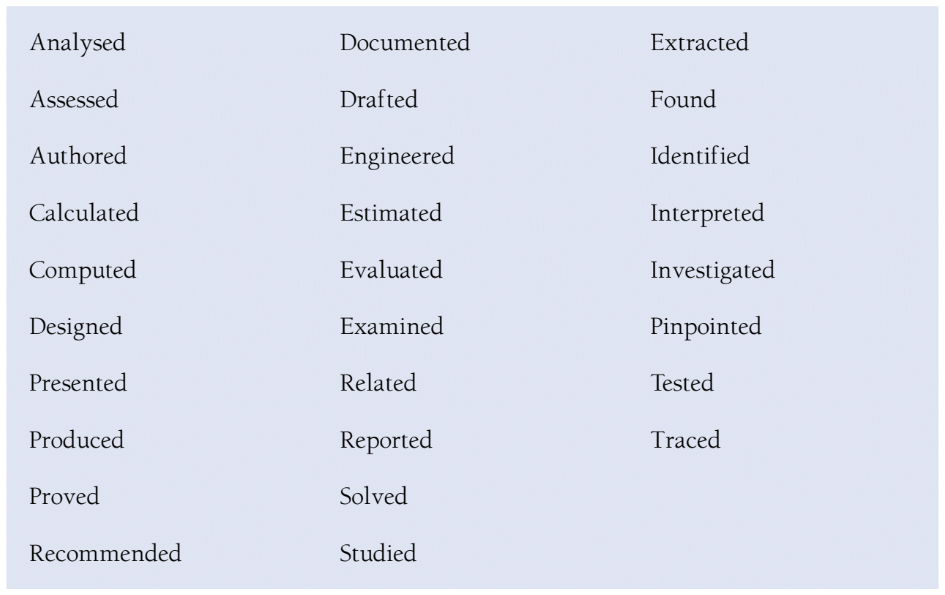
Step Three - Synthesis: Drafting the Document

Now that you have collected the information and synthesized it into usable achievements to demonstrate your skills, we are ready to embark on the business of actually putting together your resume itself.
By the end, we are aiming for something like the consulting resume sample below:

You will notice that we have highlighted the various sections of this sample resume. To see how you can produce a similar document, we'll first take some general points on the presentation before going through each of these highlighted sections in sequence.
Layout and Formatting
First things first. As we mentioned near the start of this article, you need to strictly conform to the industry standard for your resume to even be skimmed rather than immediately discarded.
The only significant variation in style is between recent graduates and young professionals. If you have less than two years in the workplace, you should put your education first, for an experienced professional's resume, education will go after work experience.
The possible exception here is where your education is significantly more impressive than your professional experience, to the point that you want to lead with the former. This kind of idiosyncratic nuance is the kind of thing best discussed with an experienced consultant as part of a mentoring programme.
Our free management consulting resume template will keep you on the straight and narrow without having to worry too much, but here are some of the most important points on formatting:
- Keep to one page. You will often hear that this is not the case and that some offices allow for a two-page resume. While this may be true, one page is always the safest option. Realistically, if you don't have 8+ years of experience, you will not really need two pages.
- Margins should be between 8mm and 16mm
- Your name should be in bold, larger type, centred at the top of the page
- Your email address and telephone number should be below your name
- Headings for each section are in upper case, bold and underlined
- More of a style consideration, but you should ideally use the rule of three - that is, three bullet points per section, etc
- No photograph. Again an occasionally controversial stipulation, and it is not a huge problem either way, but not including a photo is the safer option
- No date of birth, unless asked for by the firm.
This might seem like a lot to get right but, as mentioned, we have a free consulting resume template download below. This takes care of all these formatting issues for you, saving you time and making sure you avoid any mistakes.
Personal information
This section should be as stripped back as possible and should only contain the three essential pieces of information needed to actually get in touch with you. These are:
- Your name - in upper case in large type, so recruiters are more likely to remember it
- An institutional or standard email address (name.surname/surname.name)
- Your mobile phone number
In practice, this looks like the following:
As we noted above, you should check and re-check (and then maybe again!) that this information is correct! Candidates make a shocking number of mistakes in this section - perhaps as they assume they couldn't possibly get their own email address or phone number wrong, but they do - we see it all the time!
All the best resources in one place!
Our platform is unique in collecting everything you need to ace your interview in one convenient location, for a truly joined up experience. Sign upEducation
Up until now, education has likely been the dominant component of your life. However, you should avoid excessive focus on education in your resume.
Generally - and this goes for all sections, not just education - information should be included only insofar as it is relevant to demonstrating you have the skills required to work in consulting. For education, this means that you should include pre-university qualifications only if the employer asks for them (some firms do) or if they are exceptionally good.
As much as you should be selective as to what to include or elaborate on, though, you should never leave unexplained gaps in your education history. If you took a year out, acknowledge this, and ideally note any activities that add value to your career.
The you must include the following information in this section:
- Institution, city (only if not included in the university name) and country.
- Degree name (and qualification - UK). Include your qualification only if it's very good or outstanding (equivalent to 2:1 and higher).
- Coursework (e.g. Managerial Economics, Game Theory, Corporate Finance).
- Class rank (/GPA – US). Include class rank or GPA only if it's very good. If you think the recruiter will not understand your degree class, include an approximate percentile.
- International exchange programmes.
- Scholarships. Include scholarships awarded, without exceeding one line.
An example of a completed entry would be the following:
| 2012 - 2015 |
|
In our completed resume above, then, the education section looks like this:
Work Experience
In this section, your goal is to show that you have developed both a general familiarity with how the business world works in practice, as well as a set of specific skills that would be useful in consulting.
This section is built around two to five achievement-based bullet points where you outline your key achievements, demonstrating that you possess the desired skill set.
Don't worry if you don't have a lot to chose from here. Employers understand that if you have less than five years of experience, you probably won't have been transforming major companies. The most relevant experiences they will be looking for will likely be around exposure to top-level management or simply working independently.
As with your educational history, you cannot leave unexplained gaps in your employment history. If you are invited to interview, these will be noticed and you will be questioned on them.
Also, as a final note, bear in mind that you can also add some of your experiences to your cover letter, so there is no need to cram absolutely everything into your resume.
The information to include for each entry on your employment history is as follows:
- Job title. Include company name, city and country.
- Dates. If your experience is relatively long (2+ years) use only years. If your experience is shorter or you have some relevant short internships, use abbreviated month and year dates (eg. Feb. 2005). Whichever choice you make, be consistent throughout the resume.
- Company description. Only include this if you think recruiters will not recognise the company for which you worked.
- Achievement-based bullet points. These bullet points should use your achievements to highlight the best mix of competencies required for the job to which you are applying. Do not exceed five bullet points for any position you have covered and two to three lines for each bullet point. In general, you should include more points for more recent jobs, unless previous jobs or internships are more relevant to the position you are applying to.
An entry, then, would look something like this:
| 2012 - 2015 |
McKinsey & Company, Berlin, Germany: Business Analyst Intern
|
In our example resume above, the employment section is as follows:
Leadership and Volunteering
Employers want well-rounded candidates - perfect grades alone won't make you a good consultant. Also, amongst the hundreds of resumes flowing over recruiter's desks, you need to stand out from the crowd in some way to be noticed and remembered.
Leadership and volunteering can help on both these counts. However, space is limited (one page, remember!) and you should only include a section on leadership and volunteering if you have genuinely impressive items to include or if you need to offset a weak work experience section.
If you include a leadership and volunteering section, entries would look something like this:
| 2012 - 2015 |
ESCP Europe Entrepreneurship Society, Treasurer
|
In our example resume, the leadership and volunteering section is as follows:

Additional Information
It's easy for the additional information section to become an afterthought. However, as with the optional section on leadership and volunteering, your additional information is a chance both to impress your interviewer and to set yourself apart from the crowd with some memorable information.
Again, as with any section on leadership and volunteering, your additional information section gives you the opportunity to provide evidence of any skills that you have not been able to clearly demonstrate in the other sections of your resume.
Crucially, though, 30% or more of your interview time is likely to be spent discussing the contents of this section. This is because the fit component of the interview will often focus on experiences outside work and interviewers will tend to question you on the items in your additional information section.
Ideally, then, when selecting the information used here, one eye should always be on your fit interview. Given this, it would be sensible to read our article on fit interview techniques, so that you can use your additional information section to set yourself up to tell great personal impact stories.
To take an example, one of our clients included the following point in their additional information section:
EBay: raised more than €5k in 9 months by selling recipe books and UK-imported goods in Spain
Subsequently, all of that client's interviewers asked them questions about that experience. This was a great result for our client, as they were well prepared to talk about it.
Questions on your own experiences are always going to be more comfortable to answer than being asked to solve case studies etc. With a little attention to your resume and fit interview prep, you can make these stand-out moments for our interviewer - ultimately helping you land that job!
Okay, so we know that this section is important and that we are probably going to work the items within it into fit interview answers. However, we still need to understand what kind of thing we should actually include in our additional information section.
Assuming that you have enough material to have some real choices to make, your concern for the additional information section will be to select items that demonstrate skills that have not been sufficiently communicated in the rest of your resume.
Things that might be mentioned typically include:
- Standardised test scores, possibly with percentiles (e.g. GMAT score: 730, 96th percentile)
- Volunteering activities
- Sports achievements (e.g. Won Dutch rowing championship)
- Awards that you did not include in the Education section
- Positions in students societies / clubs / student councils (e.g. Elected student representative) if leadership and volunteering section is not present
- Entrepreneurial activities not included in Business Experience
- Interests and passions
There are also a few items that you should avoid including - either because they really belong in other sections or because recruiters will simply not be interested.
Generally, these include:
- Language certificates
- High school grades
- School competitions you won when very young (unless at national level)
As with the previous sections of the resume, you should be focussing on achievements rather than just roles that you occupied.
In terms of format, your additional information should be composed of four to six bullet points, each one or two lines long. The following is a good example of how an additional information section might look:
- GMAT score 730 (96th percentile)
- Board member and fundraising chair for Kelston Area Big Brothers Big Sisters in Newark, New Jersey (2016-2017)
- Planned and implemented the first annual city-wide Salt Lake City Marathon (2015-2018)
- Interest in Chinese studies: organized a seminar on the impact of China on the imbalances leading to the 2008 financial crisis
In our completed resume above, the additional information looks like the following:
Language and IT Skills
This section is strictly limited to two lines - one for languages and one for IT. You can get this right very easily simply by following the basic rules.
Let's see what these rules are for each of the two elements:
Languages
Your languages should be listed in order starting from your mother tongue, then English (if that isn't your mother tongue), and then the language(s) spoken in the country where you are applying, with any other languages listed last.
For each language, you choose one level to describe your proficiency, ranging from Native to Fluent to Business and finally Basic. Don't substitute certificates or examination grades for these descriptive levels. Your recruiter only cares about whether you can be trusted to talk to a client or negotiate a contract in the relevant language. They are not interested in whichever certificate you have framed in your living room from an exam years ago - you might well have forgotten it all since then anyway!
If you want to add details of certificates etc, do so in addition to these levels. For example, you might have:
Fluent English (First Certificate), Business French (Delf B1 Certificate)
IT Skills
Essential IT skills will include the Office package (Word, Excel, and PowerPoint).
If you are familiar with more advanced programs, mention them without going to too much detail. Resist the urge to show off by expounding on your knowledge of sophisticated engineering programs or similar - the HR manager reading your resume is more likely to have a background in psychology, and will not care if you are experienced in using tetrahedral elements in ABACUS.
In our completed resume above, the languages and IT skills section look like this:
Step Four - Quality Control
By now, if you have gone through all of the above, by now you should have a complete resume, neatly formatted and ostensibly ready to go. However, don't rush to hit send - you're not finished yet!
75% of candidates don’t get invited to an interview. Make sure you are in the 25%.
Learn moreRemember how crucial your resume is - how over half the cut of candidates is done on the basis of resumes alone. You are going to need to make sure you resume is the very best it can be. As such, before you submit your resume, you need to subject it to some serious quality control.
This is a three step process:
1. Revision
First, you need to go through a basic checklist to make sure you have covered everything you need to without making any obvious mistakes. We can divide this checklist into three areas: Admin, Style and Content.
Admin
- Proofread -Check that spelling, in particular, is 100% correct.
- Personal Details - Make sure these are 100% correct.
Style
- One Page - Your resume absolutely must be kept within a single printable page.
- Concise - Do not exceed two to three lines for any single bullet point.
- Consistent in Style - Use only one typeface and one type size - the only exception should be your name at the top.
- Aesthetically Pleasing - This is really a holistic consideration - when you look at the finished document, it should make sense to the eye. One important consideration is not to resort to extremes of formatting to pack more onto your page. Margins should really be no narrower than 10mm and type should be no smaller than 10pt.
Content
- No Filler - Make sure that every single point on your resume links to one of the skills required for the job. If the recruiter decided to pick a point at random, it should always convey something about a skill relevant to consulting. Content that does not do this should be revised or deleted.
- Consistency Over Style - It might seem repetitive, but make sure that each of your bullet points starts with a verb in the past tense.
2. Get Feedback
Getting decent feedback is often the hardest part of the whole resume writing process. This is because you can't actually do it for yourself!
Instead, you need to find someone else who has the competence and time to tell you what you need to know. What is more, consulting resumes are highly industry-specific, so you really need to find someone with a consulting background to get genuinely useful feedback.
This is a problem. Obviously, consultants work very long hours, so finding one with spare time will be difficult. Also, realistically, one of the reasons there is so much competition for consulting jobs is because they are very well remunerated - in other words, consultants' time does not come cheap!
If you have access to one via your university or business school, a general career advisor will have some idea of what to look for. However, this is still no replacement for a real consultant.
Maybe you are lucky and have a close friend or a sibling in consulting. However, for everyone else without this advantage, we offer a three-round, in-depth review of your resume by an ex-MBB consultant - who will work with you to make your resume the best it can be. This is the best way to make sure your resume is absolutely bulletproof and give yourself the best possible chance of being asked to interview and thus landing a job. Find out more here:
PROFESSIONAL CONSULTING RESUME REVIEW
This editing can also be done as part of a wider mentoring programme, where an experienced MBB consultant takes you through the entire selection process, from networking to interviews. Find out more here:
3. Iteration
Once you receive feedback, you obviously need to take it on board and edit your resume accordingly.
It's easy to get irrationally attached to what you have written, but - especially if you receive feedback from a real consultant - you need to be ready to swallow your pride and make substantial changes.
With this done, you should cycle back through the quality control points above - always making sure that what you end up with conforms to the initial checklist and getting feedback on the new, revised draft. Making your resume perfect will almost invariably require this kind of iteration. This is why our resume package includes three rounds of review, not just one.
Consulting Resume Template
To save you time on formatting etc, MCC has made a free resume template download for you to start from. You can download three separate versions; Word, PowerPoint and LaTeX.
Why Only One Template?
A lot of guides will try to tell you that your resume is a place to be individual and buck trends. However, this really couldn't be further from the truth - a management consulting resume is about being effective, not creative!
A recruiter going through a stack of resumes and coming across one that does not follow the required format is simply going to be annoyed, not impressed.
Remember, regardless of our own personal tastes, our goal here it to generate the consulting resume McKinsey, BCG, Deloitte or whoever else wants to see - not the one you want to write. If you think what they want is bland, then write that bland document.
Keep in mind that a lot of companies have a commercial interest in convincing you the applicant that management consulting resume writing is a more complex process than it is, so they can sell you complex and expensive consulting resume tools.
Of course, there is some limited scope within which you can exercise personal choice. However, following our free consulting resume template means that you can't go wrong in terms of formatting etc. As always, the proof is in the pudding - and our consulting resume template has already been used by scores of candidates who went on to land MBB, Big Four and other top-end jobs!
Download our consulting resume template:
Next Steps
To land an MBB or Big Four job, a solid resume is crucial. Whether you are writing a Bain, BCG, KPMG, Deloitte or McKinsey resume, the demands are going to be similar across these firms, but quite distinct from almost any other industry.
Following this guide, making use of our free consulting resume template and ideally getting feedback from a real consultant should yield an optimal resume, ready to be sent off with the rest of your application.
Your immediate step after finishing your consulting resume should be to draft your cover letter in order to complete that application.
Just like resumes, cover letters for consulting jobs are beasts all of their own and need to be tackled very differently to the ones you might be used to from other industries.
Luckily, we have you covered there too, with a guide just as comprehensive as this one. Even better, in following our method here for writing your resume, you will have already built much of the foundation for a great management consulting cover letter!
If you follow all our advice across both these guides, you should be able to submit the best possible version of your application - and should thus have every reason to expect to be invited to interview. With this being the case, you will need to start interview prep! You won't get far in a consulting interview simply walking in off the street, and the amount of preparation required is significant.
Certainly, your prep will be rather more involved than just writing a resume - so buckle up! Your first port of call should be our introductory articles on case and fit interviews. These will explain what you are up against and how to start getting ready.
If you are going to invest all this time, you will want to be sure you're spending it well. To make your prep as effective and time efficient as possible, MyConsultingCoach produces a comprehensive course to prepare you fully for both the case and fit components of the interview process. This will give you the best chance of impressing your interviewers and landing your dream management consulting job!

